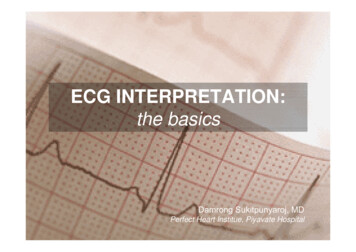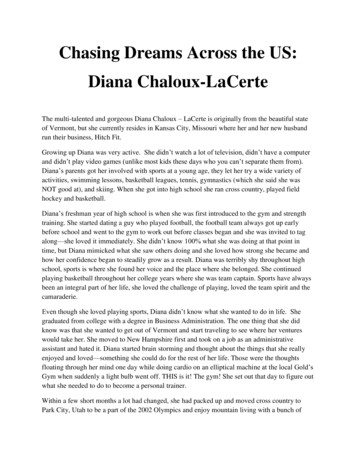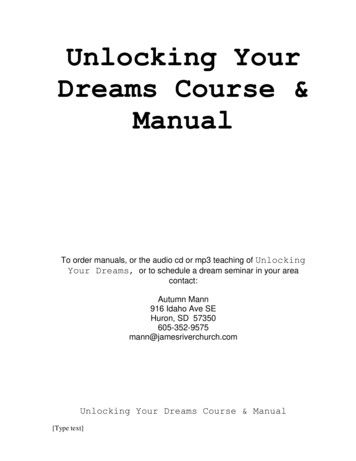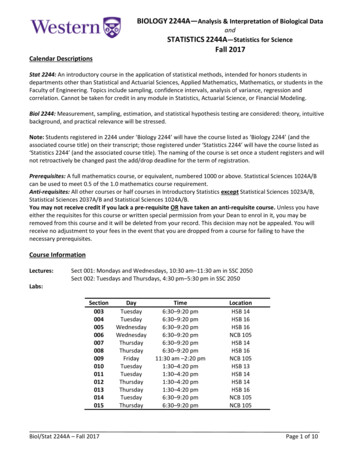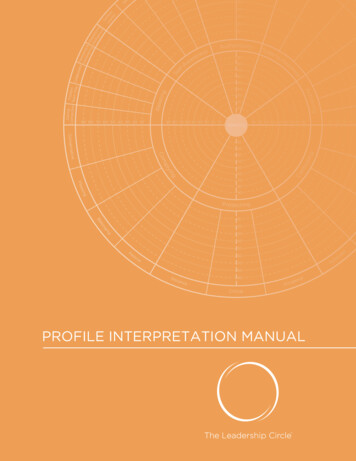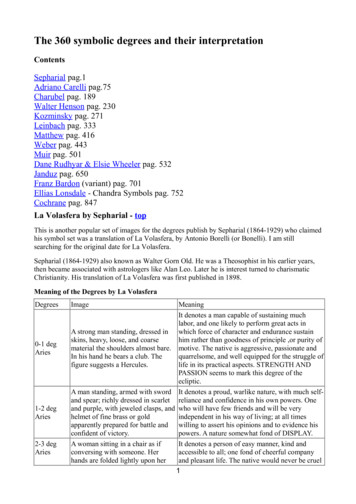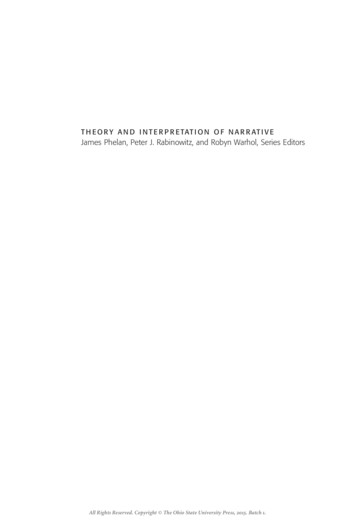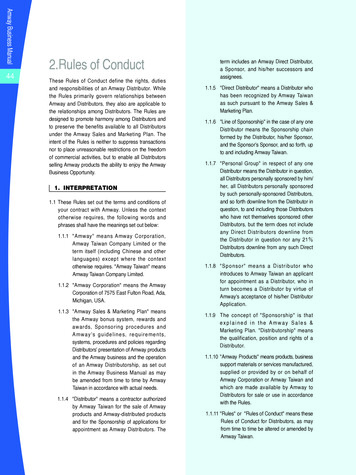
Transcription
The Interpretation of DreamsSigmund Freud (1900)PREFACE TO THE THIRD EDITIONWheras there was a space of nine years between the first and second editions of this book, the need of a third edition was apparent when littlemore than a year had elapsed. I ought to be gratified by this change; but if I was unwilling previously to attribute the neglect of my work to itssmall value, I cannot take the interest which is now making its appearance as proof of its quality.The advance of scientific knowledge has not left The Interpretation of Dreams untouched. When I wrote this book in 1899 there was as yet no"sexual theory," and the analysis of the more complicated forms of the psychoneuroses was still in its infancy. The interpretation of dreams wasintended as an expedient to facilitate the psychological analysis of the neuroses; but since then a profounder understanding of the neuroses hascontributed towards the comprehension of the dream. The doctrine of dream-interpretation itself has evolved in a direction which wasinsufficiently emphasized in the first edition of this book. From my own experience, and the works of Stekel and other writers, [1] I have sincelearned to appreciate more accurately the significance of symbolism in dreams (or rather, in unconscious thought). In the course of years, a massof data has accumulated which demands consideration. I have endeavored to deal with these innovations by interpolations in the text and
footnotes. If these additions do not always quite adjust themselves to the framework of the treatise, or if the earlier text does not everywhere comeup to the standard of our present knowledge, I must beg indulgence for this deficiency, since it is only the result and indication of the increasinglyrapid advance of our science. I will even venture to predict the directions in which further editions of this book - should there be a demand forthem - may diverge from previous editions. Dream-interpretation must seek a closer union with the rich material of poetry, myth, and popularidiom, and it must deal more faithfully than has hitherto been possible with the relations of dreams to the neuroses and to mental derangement.Herr Otto Rank has afforded me valuable assistance in the selection of supplementary examples, and has revised the proofs of this edition. I haveto thank him and many other colleagues for their contributions and corrections.Vienna, 1911 [1] Omitted in subsequent editions.PREFACE TO THE SECOND EDITIONThat there should have been a demand for a second edition of this book - a book which cannot be described as easy to read - before thecompletion of its first decade is not to be explained by the interest of the professional circles to which I was addressing myself. My psychiatriccolleagues have not, apparently, attempted to look beyond the astonishment which may at first have been aroused by my novel conception of thedream; and the professional philosophers, who are anyhow accustomed to disposing of the dream in a few sentences - mostly the same - as asupplement to the states of consciousness, have evidently failed to realize that precisely in this connection it was possible to make all manner ofdeductions, such as must lead to a fundamental modification of our psychological doctrines. The attitude of the scientific reviewers was such tolead me to expect that the fate of the book would be to fall into oblivion; and the little flock of faithful adherents, who follow my lead in thetherapeutic application of psycho-analysis, and interpret dreams by my method, could not have exhausted the first edition of this book. I feel,therefore, that my thanks are due to the wider circle of cultured and inquiring readers whose sympathy has induced me, after the lapse of nineyears, once more to take up this difficult work, which has so many fundamental bearings.I am glad to be able to say that I found little in the book that called for alteration. Here and there I have interpolated fresh material, or have addedopinions based on more extensive experience, or I have sought to elaborate individual points; but the essential passages treating of dreams andtheir interpretation, and the psychological doctrines to be deduced therefrom, have been left unaltered; subjectively, at all events, they have stoodthe test of time. Those who are acquainted with my other writings (on the aetiology and mechanism of the psychoneuroses) will know that I neveroffer unfinished work as finished, and that I have always endeavoured to revise my conclusions in accordance with my maturing opinions; but asregards the subject of the dream-life, I am able to stand by my original text. In my many years' work upon the problems of the neuroses I haveoften hesitated, and I have often gone astray; and then it was always the interpretation of dreams that restored my self-confidence. My manyscientific opponents are actuated by a wise instinct when they decline to follow me into the region of oneirology.Even the material of this book, even my own dreams, defaced by time or superseded, by means of which I have demonstrated the rules of dreaminterpretation, revealed, when I came to revise these pages, a continuity that resisted revision. For me, of course, this book has an additionalsubjective significance, which I did not understand until after its completion. It reveals itself to me as a piece of my self-analysis, as my reactionto the death of my father, that is, to the most important event, the most poignant loss in a man's life. Once I had realized this, I felt that I could notobliterate the traces of this influence. But to my readers the material from which they learn to evaluate and interpret dreams will be a matter ofindifference.Where an inevitable comment could not be fitted into the old context, I have indicated by square brackets that it does not occur in the firstedition.[2]Berchtesgaden, 1908 [2] Omitted in subsequent editions.INTRODUCTORY NOTE (to the first edition)In this volume I have attempted to expound the methods and results of dream-interpretation; and in so doing I do not think I have overstepped theboundary of neuro-pathological science. For the dream proves on psychological investigation to be the first of a series of abnormal psychicformations, a series whose succeeding members - the hysterical phobias, the obsessions, the delusions - must, for practical reasons, claim theattention of the physician. The dream, as we shall see, has no title to such practical importance, but for that very reason its theoretical value as atypical formation is all the greater, and the physician who cannot explain the origin of dream-images will strive in vain to understand the phobiasand the obsessive and delusional ideas, or to influence them by therapeutic methods.
But the very context to which our subject owes its importance must be held responsible for the deficiencies of the following chapters. Theabundant lacunae in this exposition represent so many points of contact at which the problem of dream-formation is linked up with the morecomprehensive problems of psycho-pathology; problems which cannot be treated in these pages, but which, if time and powers suffice and iffurther material presents itself, may be elaborated elsewhere.The peculiar nature of the material employed to exemplify the interpretation of dreams has made the writing even of this treatise a difficult task.Consideration of the methods of dream-interpretation will show why the dreams recorded in the literature on the subject, or those collected bypersons unknown to me, were useless for my purpose; I had only the choice between my own dreams and those of the patients whom I wastreating by psychoanalytic methods. But this later material was inadmissible, since the dream-processes were undesirably complicated by theintervention of neurotic characters. And if I relate my own dreams I must inevitably reveal to the gaze of strangers more of the intimacies of mypsychic life than is agreeable to me, and more than seems fitting in a writer who is not a poet but a scientific investigator. To do so is painful, butunavoidable; I have submitted to the necessity, for otherwise I could not have demonstrated my psychological conclusions. Sometimes, of course,I could not resist the temptation to mitigate my indiscretions by omissions and substitutions; but wherever I have done so the value of the examplecited has been very definitely diminished. I can only express the hope that my readers will understand my difficult position, and will be indulgent;and further, that all those persons who are in any way concerned in the dreams recorded will not seek to forbid our dream-life at all events toexercise freedom of thought!The Interpretation of DreamsCHAPTER 1THE SCIENTIFIC LITERATURE OFDREAM-PROBLEMS (UP TO 1900)In the following pages I shall demonstrate that there is a psychological technique which makes it possible to interpret dreams, and that on theapplication of this technique every dream will reveal itself as a psychological structure, full of significance, and one which may be assigned to aspecific place in the psychic activities of the waking state. Further, I shall endeavour to elucidate the processes which underlie the strangeness andobscurity of dreams, and to deduce from these processes the nature of the psychic forces whose conflict or cooperation is responsible for ourdreams. This done, my investigation will terminate, as it will have reached the point where the problem of the dream merges into morecomprehensive problems, and to solve these we must have recourse to material of a different kind.I shall begin by giving a short account of the views of earlier writers on this subject, and of the status of the dream-problem in contemporaryscience; since in the course of this treatise I shall not often have occasion to refer to either. In spite of thousands of years of endeavour, littleprogress has been made in the scientific understanding of dreams. This fact has been so universally acknowledged by previous writers on thesubject that it seems hardly necessary to quote individual opinions. The reader will find, in the works listed at the end of this work, manystimulating observations, and plenty of interesting material relating to our subject, but little or nothing that concerns the true nature of the dream,or that solves definitely any of its enigmas. The educated layman, of course, knows even less of the matter.The conception of the dream that was held in prehistoric ages by primitive peoples, and the influence which it may have exerted on the formationof their conceptions of the universe, and of the soul, is a theme of such great interest that it is only with reluctance that I refrain from dealing withit in these pages. I will refer the reader to the well-known works of Sir John Lubbock (Lord Avebury), Herbert Spencer, E. B. Tylor, and otherwriters; I will only add that we shall not realize the importance of these problems and speculations until we have completed the task of dreaminterpretation that lies before us.A reminiscence of the concept of the dream that was held in primitive times seems to underlie the evaluation of the dream which was currentamong the peoples of classical antiquity.[1] They took it for granted that dreams were related to the world of the supernatural beings in whomthey believed, and that they brought inspirations from the gods and demons. Moreover, it appeared to them that dreams must serve a specialpurpose in respect of the dreamer; that, as a rule, they predicted the future. The extraordinary variations in the content of dreams, and in theimpressions which they produced on the dreamer, made it, of course, very difficult to formulate a coherent conception of them, and necessitatedmanifold differentiations and group-formations, according to their value and reliability. The valuation of dreams by the individual philosophers ofantiquity naturally depended on the importance which they were prepared to attribute to manticism in general.In the two works of Aristotle in which there is mention of dreams, they are already regarded as constituting a problem of psychology. We are told
that the dream is not god-sent, that it is not of divine but of demonic origin. For nature is really demonic, not divine; that is to say, the dream isnot a supernatural revelation, but is subject to the laws of the human spirit, which has, of course, a kinship with the divine. The dream is definedas the psychic activity of the sleeper, inasmuch as he is asleep. Aristotle was acquainted with some of the characteristics of the dream-life; forexample, he knew that a dream converts the slight sensations perceived in sleep into intense sensations ("one imagines that one is walkingthrough fire, and feels hot, if this or that part of the body becomes only quite slightly warm"), which led him to conclude that dreams might easilybetray to the physician the first indications of an incipient physical change which escaped observation during the day.[2]As has been said, those writers of antiquity who preceded Aristotle did not regard the dream as a product of the dreaming psyche, but as aninspiration of divine origin, and in ancient times the two opposing tendencies which we shall find throughout the ages in respect of the evaluationof the dream-life were already perceptible. The ancients distinguished between the true and valuable dreams which were sent to the dreamer aswarnings, or to foretell future events, and the vain, fraudulent, and empty dreams whose object was to misguide him or lead him to destruction.Gruppe[3] speaks of such a classification of dreams, citing Macrobius and Artemidorus: "Dreams were divided into two classes; the first classwas believed to be influenced only by the present (or the past), and was unimportant in respect of the future; it included the enuknia (insomnia),which directly reproduce a given idea or its opposite; e.g., hunger or its satiation; and the phantasmata, which elaborate the given ideaphantastically, as e.g. the nightmare, ephialtes. The second class of dreams, on the other hand, was determinative of the future. To this belonged:1. Direct prophecies received in the dream (chrematismos, oraculum);2. the foretelling of a future event (orama, visio);3. the symbolic dream, which requires interpretation (oneiros, somnium.)This theory survived for many centuries."Connected with these varying estimations of the dream was the problem of "dream-interpretation." Dreams in general were expected to yieldimportant solutions, but not every dream was immediately understood, and it was impossible to be sure that a certain incomprehensible dream didnot really foretell something of importance, so that an effort was made to replace the incomprehensible content of the dream by something thatshould be at once comprehensible and significant. In later antiquity Artemidorus of Daldis was regarded as the greatest authority on dreaminterpretation. His comprehensive works must serve to compensate us for the lost works of a similar nature[4] The pre-scientific conception of thedream which obtained among the ancients was, of course, in perfect keeping with their general conception of the universe, which was accustomedto project as an external reality that which possessed reality only in the life of the psyche. Further, it accounted for the main impression madeupon the waking life by the morning memory of the dream; for in this memory the dream, as compared with the rest of the psychic content, seemsto be something alien, coming, as it were, from another world. It would be an error to suppose that theory of the supernatural origin of dreamslacks followers even in our own times; for quite apart from pietistic and mystical writers - who cling, as they are perfectly justified in doing, tothe remnants of the once predominant realm of the supernatural until these remnants have been swept away by scientific explanation - we notinfrequently find that quite intelligent persons, who in other respects are averse from anything of a romantic nature, go so far as to base theirreligious belief in the existence and co-operation of superhuman spiritual powers on the inexplicable nature of the phenomena of dreams(Haffner). The validity ascribed to the dream-life by certain schools of philosophy - for example, by the school of Schelling - is a distinctreminiscence of the undisputed belief in the divinity of dreams which prevailed in antiquity; and for some thinkers the mantic or prophetic powerof dreams is still a subject of debate. This is due to the fact that the explanations attempted by psychology are too inadequate to cope with theaccumulated material, however strongly the scientific thinker may feel that such superstitious doctrines should be repudiated.To write strongly the history of our scientific knowledge of the dream-problem is extremely difficult, because, valuable though this knowledgemay be in certain respects, no real progress in a definite direction is as yet discernible. No real foundation of verified results has hitherto beenestablished on which future investigators might continue to build. Every new author approaches the same problems afresh, and from the verybeginning. If I were to enumerate such authors in chronological order, giving a survey of the opinions which each has held concerning theproblems of the dream, I should be quite unable to draw a clear and complete picture of the present state of our knowledge on the subject. I havetherefore preferred to base my method of treatment on themes rather than on authors, and in attempting the solution of each problem of the dreamI shall cite the material found in the literature of the subject.But as I have not succeeded in mastering the whole of this literature - for it is widely dispersed, and interwoven with the literature of othersubjects - I must ask my readers to rest content with my survey as it stands, provided that no fundamental fact or important point of view has beenoverlooked.Until recently most authors have been inclined to deal with the subjects of sleep and dreams in conjunction, and together with these they havecommonly dealt with analogous conditions of a psycho-pathological nature, and other dream-like phenomena, such as hallucinations, visions, etc.In recent works, on the other hand, there has been a tendency to keep more closely to the theme, and to consider, as a special subject, the separateproblems of the dream-life. In this change I should like to perceive an expression of the growing conviction that enlightenment and agreement in
such obscure matters may be attained only by a series of detailed investigations. Such a detailed investigation, and one of a special psychologicalnature, is expounded in these pages. I have had little occasion to concern myself with the problem of sleep, as this is essentially a physiologicalproblem, although the changes in the functional determination of the psychic apparatus should be included in a description of the sleeping state.The literature of sleep will therefore not be considered here.A scientific interest in the phenomena of dreams as such leads us to propound the following problems, which to a certain extent, interdependent,merge into one another.A. The Relation of the Dream to the Waking StateThe naive judgment of the dreamer on waking assumes that the dream - even if it does not come from another world - has at all events transportedthe dreamer into another world. The old physiologist, Burdach, to whom we are indebted for a careful and discriminating description of thephenomena of dreams, expressed this conviction in a frequently quoted passage (p. 474): "The waking life, with its trials and joys, its pleasuresand pains, is never repeated; on the contrary, the dream aims at relieving us of these. Even when our whole mind is filled with one subject, whenour hearts are rent by bitter grief, or when some task has been taxing our mental capacity to the utmost, the dream either gives us somethingentirely alien, or it selects for its combinations only a few elements of reality; or it merely enters into the key of our mood, and symbolizesreality." J. H. Fichte (I. 541) speaks in precisely the same sense of supplementary dreams, calling them one of the secret, self-healing benefits ofthe psyche. L. Strumpell expresses himself to the same effect in his Natur und Entstehung der Traume, a study which is deservedly held in highesteem. "He who dreams turns his back upon the world of waking consciousness" (p. 16); "In the dream the memory of the orderly content ofwaking consciousness and its normal behaviour is almost entirely lost" (p. 17); "The almost complete and unencumbered isolation of the psychein the dream from the regular normal content and course of the waking state." (p. 19).Yet the overwhelming majority of writers on the subject have adopted the contrary view of the relation of the dream to waking life. Thus Haffner(p. 19): "To begin with, the dream continues the waking life. Our dreams always connect themselves with such ideas as have shortly before beenpresent in our consciousness. Careful examination will nearly always detect a thread by which the dream has linked itself to the experiences of theprevious day." Weygandt (p. 6) flatly contradicts the statement of Burdach. "For it may often be observed, apparently indeed in the great majorityof dreams, that they lead us directly back into everyday life, instead of releasing us from it." Maury (p. 56) expresses the same idea in a conciseformula: "Nous revons de ce que nous avons vu, dit, desire, ou fait."[5] Jessen, in his Psychologie, published in 1855 (p. 530), is rather moreexplicit: "The content of dreams is always more or less determined by the personality, the age, sex, station in life, education and habits, and by theevents and experiences of the whole past life of the individual."The philosopher, I. G. E. Maas, adopts the most unequivocal attitude in respect of this question (Uber die Leidenschaften, 1805): "Experiencecorroborates our assertion that we dream most frequently of those things toward which our warmest passions are directed. This shows us that ourpassions must influence the generation of our dreams. The ambitious man dreams of the laurels which he has won (perhaps only in imagination),or has still to win, while the lover occupies himself, in his dreams, with the object of his dearest hopes. All the sensual desires and loathingswhich slumber in the heart, if they are stimulated by any cause, may combine with other ideas and give rise to a dream; or these ideas may minglein an already existing dream."[6]The ancients entertained the same idea concerning the dependence of the dream-content on life. I will quote Radestock (p. 139): "When Xerxes,before his expedition against Greece, was dissuaded from his resolution by good counsel, but was again and again incited by dreams to undertakeit, one of the old, rational dream-interpreters of the Persians, Artabanus, told him, and very appropriately, that dream-images for the most partcontain that of which one has been thinking in the waking state."In the didactic poem of Lucretius, On the Nature of Things (IV. 962), there occurs this passage:"Et quo quisque fere studio devinctus adhaeret, aut quibus in rebus multum sumus ante morati atque in ea ratione fuit contenta magis mens, insomnis eadem plerumque videmur obire; causidici causas agere et componere leges, induperatores pugnare ac proelia obire,". etc., etc.[7] Cicero(De Divinatione, II. LXVII) says, in a similar strain, as does also Maury many centuries later: "Maximeque 'reliquiae' rerum earum moventur inanimis et agitantur, de quibus vigilantes aut cogitavimus aut egimus."[8]The contradiction between these two views concerning the relation between dream life and waking life seems indeed irresolvable. Here we mayusefully cite the opinion of F. W. Hildebrandt (1875), who held that on the whole the peculiarities of the dream can only be described as "a seriesof contrasts which apparently amount to contradictions" (p. 8). "The first of these contrasts is formed by the strict isolation or seclusion of thedream from true and actual life on the one hand, and on the other hand by the continuous encroachment of the one upon the other, and theconstant dependence of the one upon the other. The dream is something absolutely divorced from the reality experienced during the waking state;one may call it an existence hermetically sealed up and insulated from real life by an unbridgeable chasm. It frees us from reality, blots out thenormal recollection of reality, and sets us in another world and a totally different life, which fundamentally has nothing in common with reallife." Hildebrandt then asserts that in falling asleep our whole being, with its forms of existence, disappears "as through an invisible trapdoor."In one's dream one is perhaps making a voyage to St. Helena in order to offer the imprisoned Napoleon an exquisite vintage of Moselle. One is
most affably received by the ex-emperor, and one feels almost sorry when, on waking, the interesting illusion is destroyed. But let us nowcompare the situation existing in the dream with the actual reality. The dreamer has never been a wine-merchant, and has no desire to becomeone. He has never made a sea-voyage, and St. Helena is the last place in the world that he would choose as the destination of such a voyage. Thedreamer feels no sympathy for Napoleon, but on the contrary a strong patriotic aversion. And lastly, the dreamer was not yet among the livingwhen Napoleon died on the island of St. Helena; so that it was beyond the realms of possibility that he should have had any personal relationswith Napoleon. The dream-experience thus appears as something entirely foreign, interpolated between two mutually related and successiveperiods of time."Nevertheless," continues Hildebrandt, "the apparent contrary is just as true and correct. I believe that side by side with this seclusion andinsulation there may still exist the most intimate interrelation. We may therefore justly say: Whatever the dream may offer us, it derives itsmaterial from reality, and from the psychic life centered upon this reality. However extraordinary the dream may seem, it can never detach itselffrom the real world, and its most sublime as well as its most ridiculous constructions must always borrow their elementary material either fromthat which our eyes have beheld in the outer world, or from that which has already found a place somewhere in our waking thoughts; in otherwords, it must be taken from that which we have already experienced, either objectively or subjectively."B. The Material of Dreams - Memory in DreamsThat all the material composing the content of a dream is somehow derived from experience, that it is reproduced or remembered in the dream this at least may be accepted as an incontestable fact. Yet it would be wrong to assume that such a connection between the dream-content andreality will be easily obvious from a comparison between the two. On the contrary, the connection must be carefully sought, and in quite anumber of cases it may for a long while elude discovery. The reason for this is to be found in a number of peculiarities evinced by the faculty ofmemory in dreams; which peculiarities, though generally observed, have hitherto defied explanation. It will be worth our while to examine thesecharacteristics exhaustively.To begin with, it happens that certain material appears in the dream-content which cannot be subsequently recognized, in the waking state, asbeing part of one's knowledge and experience. One remembers clearly enough having dreamed of the thing in question, but one cannot recall theactual experience or the time of its occurrence. The dreamer is therefore in the dark as to the source which the dream has tapped, and is eventempted to believe in an independent productive activity on the part of the dream, until, often long afterwards, a fresh episode restores thememory of that former experience, which had been given up for lost, and so reveals the source of the dream. One is therefore forced to admit thatin the dream something was known and remembered that cannot be remembered in the waking state.[9]Delboeuf relates from his own experience an especially impressive example of this kind. He saw in his dream the courtyard of his house coveredwith snow, and found there two little lizards, half-frozen and buried in the snow. Being a lover of animals he picked them up, warmed them, andput them back into the hole in the wall which was reserved especially for them. He also gave them a few fronds of a little fern which was growingon the wall, and of which he knew they were very fond. In the dream he knew the name of the plant; Asplenium ruta muralis. The dreamcontinued returning after a digression to the lizards, and to his astonishment Delboeuf saw two other little lizards falling upon what was left of theferns. On turning his eyes to the open fields he saw a fifth and a sixth lizard making for the hole in the wall, and finally the whole road wascovered by a procession of lizards, all wandering in the same direction.In his waking state Delboeuf knew only a few Latin names of plants, and nothing of any Asplenium. To his great surprise he discovered that afern of this name did actually exist, and that the correct name was Asplenium ruta muraria, which the dream had slightly distorted. An accidentalcoincidence was of course inconceivable; yet where he got his knowledge of the name Asplenium in the dream remained a mystery to him.The dream occurred in 1862. Sixteen years later, while at the house of one of his friends, the philosopher noticed a small album containing driedplants, such as are sold as souvenirs to visitors in many parts of Switzerland. A sudden recollection came to him: he opened the herbarium,discovered therein the Asplenium of his dream, a
intended as an expedient to facilitate the psychological analysis of the neuroses; but since then a profounder understanding of the neuroses has contributed towards the comprehension of the dream. The doctrine of dream-interpretation itself has evolved in a direction which was ins
